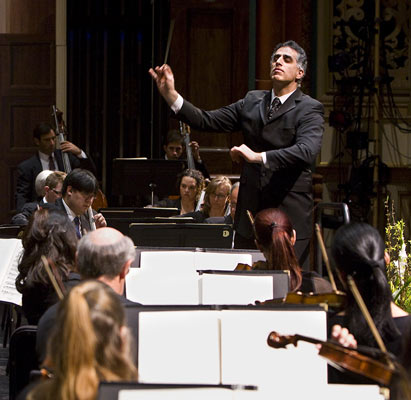Santa Barbara Symphony at the Granada
Kabaretti in Fine Form

Nir Kabaretti, the music and artistic director of the Santa Barbara Symphony, bared his Italian heart and soul at this, the most effortlessly impressive and sparkling concert he has conducted thus far with the orchestra. The program promised an evening of Italian festivity, the kind associated not only with village fairs and carnivals, but also with the elegant excitement and accompanying revelry of the grand operas. It served as a notice that we have a very talented conductor of Italian opera in our midst, and one who is prepared to infuse the upcoming Opera Santa Barbara season at the Granada with uncommon wit and verve (Kabaretti will conduct Carmen on March 7 and 15). It also hinted at what is in store next month, when the symphony will send its biggest Valentine to Felix Mendelssohn.
The orchestra began with the overture to Roman Carnival, Op. 9 of Hector Berlioz. Teag Reeves and Stephanie Stetson made the most of the piece’s generous horn parts, setting the tone for what became an evening’s lavish outpouring of dance-based themes. Next came the Mendelssohn Symphony No. 4 in A Major, Op. 90, “Italian.” Mendelssohn’s version of Italy has all the quiet grace and intellectual distinction of a proper European gentleman’s grand tour-with none of the inconveniences. Flitting here and there within the great treasure trove of Italian sounds, from the religious music of the Andante to the slow and then fast dances of the third and fourth movements, this is one of the most consummately crafted symphonies in the repertoire. The orchestra was well up to the task, and Kabaretti called out principal bassoonist Andy Radford during the applause to recognize his superb work on the trio section in the third movement, “Con moto moderato.”
Despite the technical genius and sheer elegance of the Mendelssohn, the concert’s highlights remained to be revealed in the second half. Each of the three opera excerpts, and the finale from Tchaikovsky, were brilliantly chosen and executed. From the moment the first tambourine sounded in Rossini’s overture to L’Italiana in Algeri, one felt that enchantment was in the air. Simply by juxtaposition, Kabaretti and his musicians were able to tell the story of Italian opera, moving through very different works by masters Verdi and Puccini before ascending to the heights of the finale, Tchaikovsky’s Cappricio Italien, Op. 45.
Kabaretti limited himself to very few words of introduction, speaking somewhat lightly of the invention of gelato at the beginning of the second half. But the proof was in the music, which was much more than a sweet confection.



